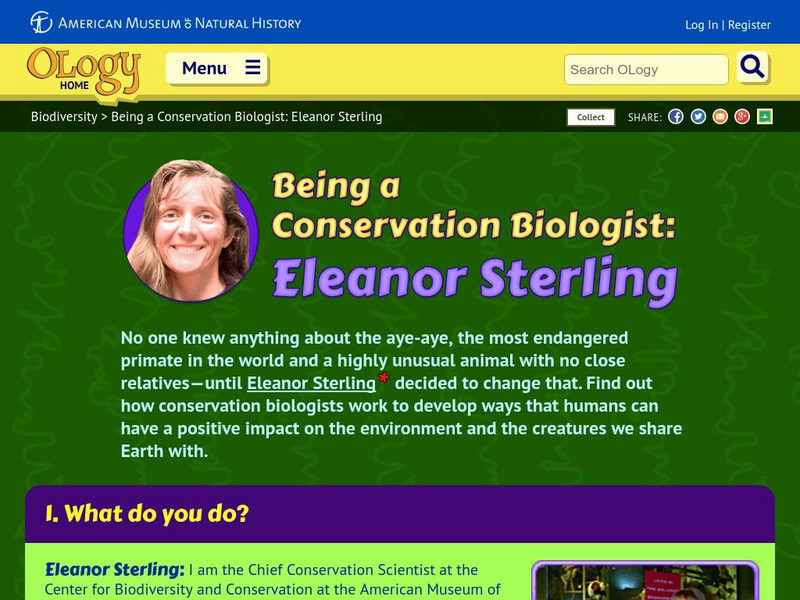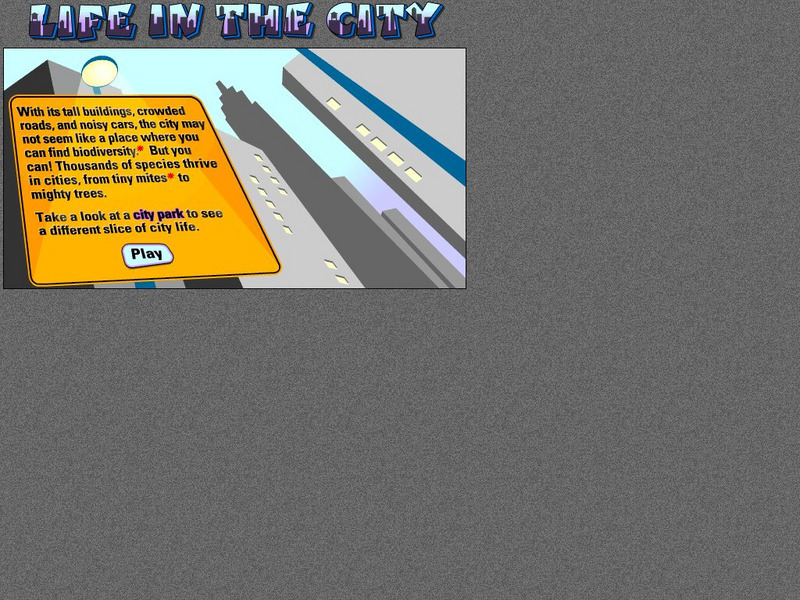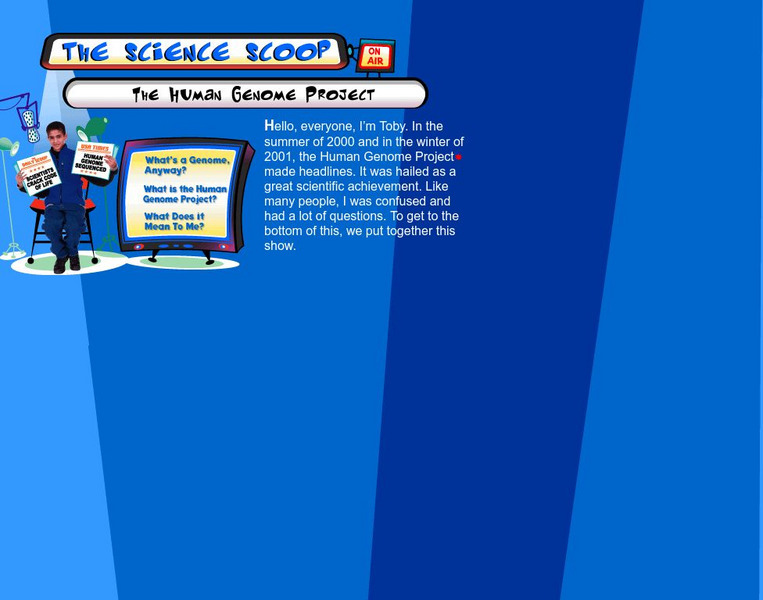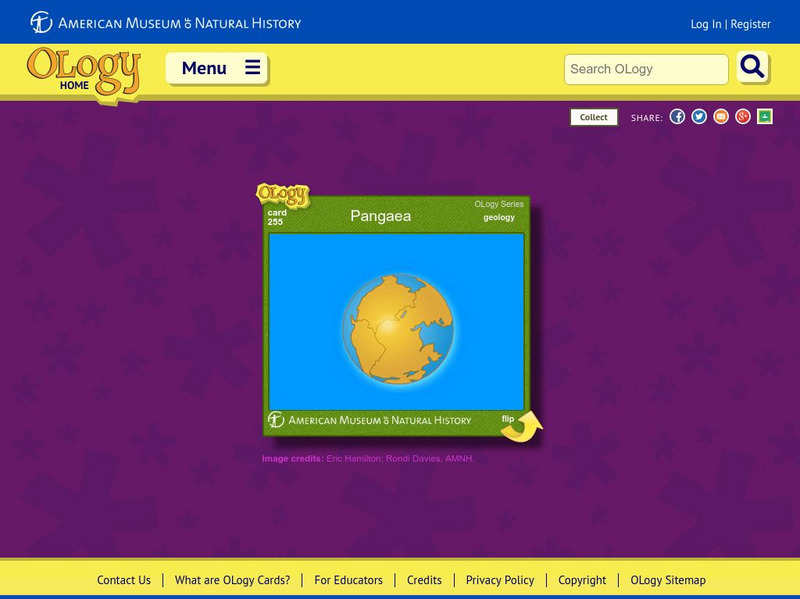American Museum of Natural History
American Museum of Natural History: Fossil Fuels O Logy Card
Check out this Ology card and activity identifying fossil fuels.
American Museum of Natural History
American Museum of Natural History: Conservation Biologist Eleanor Sterling
Interview with conservationist Eleanor Sterling provides insights into her research interests, her career preparation, and advice for kids interested in doing field investigations in biology.
American Museum of Natural History
American Museum of Natural History: Ology: Astronomy: Are You Cut Out for Mars?
Do you have what it takes to go on a space mission to the Red Planet? Think you can handle it? Take this quiz to find out!
American Museum of Natural History
American Museum of Natural History: O Logy: What's the Big Idea? Marine Biology
An introduction to key concepts about the ocean, its ecosystems, and zones. With interactive flash cards that open in new windows to help you learn more.
American Museum of Natural History
American Museum of Natural History: O Logy: Bio Benefits
What does it take to keep our planet livable? What are the things we need to sustain life? The Bio-Benefits site answers these questions and others pertaining to basic life needs. Click on the hyperlinked words to see interactive...
American Museum of Natural History
American Museum of Natural History: Ology: Kinds of Biodiversity
Explains what biodiversity is, why it is important, threats it faces, and what people can do to help it survive.
American Museum of Natural History
American Museum of Natural History: O Logy: Stuff to Do: Density of Salty Water
An experiment to test what happens when ocean water hits a freshwater estuary. Each step is demonstrated with photographs and the difference between salinity and density is explained.
American Museum of Natural History
American Museum of Natural History: Jade O Logy Card
Investigate some facts about jade by reading this interactive Ology card then answering some questions.
American Museum of Natural History
American Museum of Natural History: O Logy: Life in the City
Biodiversity can be found in many places, including city parks. At this OLogy learning game site, players use a magnifying glass to find organisms that live there and also learn something about how each organism relates to others nearby.
American Museum of Natural History
American Museum of Natural History: Ology: Moving Mammals
Students explore the different ways mammals move by observing them walk, hop, gallop, swim and swing in animations. Facts about habitat and structure are also included in these animations.
American Museum of Natural History
American Museum of Natural History: Ology: Cosmic Cookies
Roll your mouse over the planets in our solar system to read a vignette about each. Then, link to the recipe for directions to create miniature planet cookies that look like the real thing.
American Museum of Natural History
American Museum of Natural History: Ology: Milky Way Galaxy
How big is a billion? Find out some interesting facts about our galaxy, the Milky Way, and its billion stars.
American Museum of Natural History
American Museum of Natural History: O Logy: Light, Matter, Energy
Learn how Einstein revolutionized how we think about light, matter, and energy by asking challenging questions and questioning old ideas.
American Museum of Natural History
American Museum of Natural History: O Logy: Human Genome Project
Get the science scoop on the Human Genome Project by considering the answers to these three questions: What is a genome? What is the Human Genome Project? What does it mean to me?
American Museum of Natural History
American Museum of Natural History: O Logy: Stuff to Do: Dna in a Blender
Follow these illustrated instructions to conduct a simple experiment in separating DNA from an onion!
American Museum of Natural History
American Museum of Natural History: Ology: Life in the City
Explore a city park to learn what tiny species live there.
American Museum of Natural History
American Museum of Natural History: O Logy: Stuff to Do: Make a Weather Station
Make a wind vane, rain gauge, and barometer and learn how to measure wind direction, rainfall, and air pressure.
American Museum of Natural History
American Museum of Natural History: Paula Mikkelsen O Logy Card
Flip this interactive OLogy card to learn about zoology careers from zoologist Paula Mikkelsen.
American Museum of Natural History
American Museum of Natural History: Pangaea O Logy Card
Learn about the supercontinent known as Pangaea that broke apart into the continents that we know today. Answer questions when you finish reading.
American Museum of Natural History
American Museum of Natural History: Venus O Logy Card
Flip this interactive card to start learning about the planet Venus. Answer multiple-choice and fact-or-fiction questions and review some fast facts about Venus.
American Museum of Natural History
American Museum of Natural History: Pelecanimimus Polyodon O Logy Card
Flip this interactive card to start learning about Pelecanimimus polyodon. Answer multiple-choice and fact-or-fiction questions and review some fast facts about this theropod dinosaur.
American Museum of Natural History
American Museum of Natural History: Gastonia Burgei O Logy Card
Flip this interactive card to start learning about the Gastonia Burgei, an armored dinosaur from the Early Cretaceous. Answer multiple-choice and fact-or-fiction questions and review some fast facts about this primitive dinosaur.
American Museum of Natural History
American Museum of Natural History: Craters O Logy Card
Flip this interactive card to start learning about craters. Answer multiple-choice and fact-or-fiction questions and review some fast facts.
American Museum of Natural History
American Museum of Natural History: Drinker Nisti O Logy Card
Flip this interactive card to start learning about Drinker Nisti, an ornithopod from the Late Jurassic-Early Cretaceous period. Answer multiple-choice and fact-or-fiction questions and review some fast facts about this dinosaur.





















